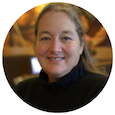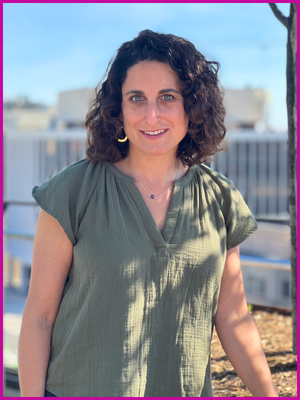|
At the end of 2020, we asked our staff to reflect on the past year. Over the upheavals of the past twelve months, we’ve been makers, breakers, and innovators. We’ve learned some essential lessons about how our work creates change, and how we are changed by it. This week, like last week, we’re sharing those reflections with you. - Brad  "Less is more" was the mantra of many schools (and rightly so) as we pivoted from campus-based to emergency remote teaching in the spring of 2020. At the time, the idea was, naively, to survive a temporary shift to online instruction. Now, as schools try to stay focused on their mission and core values amidst this swirl of complexity, "less is more" isn’t a strategy to survive. Instead, it’s a directive to thrive. Right now, the upheavals of running a school ask leaders to keep one, or just a few, true north stars--a very small set of institutional priorities that are fundamental to the school’s identity. The challenge is to articulate those few priorities at every turn, and intentionally connect programming, practices, and policies to those driving principles. Alignment and effective communication allow each school to be excellent in its own way, and avoid the trap of trying to please everyone. As a new member of the One Schoolhouse team, I have seen this approach in practice in an intentional and aligned way. One Schoolhouse's mission calls us to "empower learning and transform education," and our pedagogical north star is personalized, competency-based learning grounded in strong student-teacher relationships. We reflect that approach in our pedagogy white paper, course development standards, and teacher training and competencies, as well as our student surveys and data analysis. In short, we are able to be focused and effective in our work because we've articulated what we are about. Because we know what's essential to us, we can more easily say no to what’s extraneous. When we sharpen our focus, we do more of what matters. Meera Shah, Director of Studies  It's a challenge to narrow these to just 1 or 2 sentences, but I think my greatest lesson learned is just how important relationships are. It would have been so much harder to get through this year without colleagues, friends, and family to share ideas and reaffirm each other. The remote nature of everything has made this especially clear. Lynnae Boudreau, Instructional Designer  This has been a learning year, for sure. I’ve learned a whole lot about how schools work and about the pressures that society puts on all schools to be perfectly accommodating to every demand. I’ve seen teachers and administrators worn to ragged ends by the competing urgencies in their lives—urgencies that include, it must be said, the need to make positive things happen in their personal worlds when others around them are also frazzled. My late father, a pessimist about so much in his life, once told me to never say things couldn’t get worse, because then they would. The year 2020 has proved him correct on that point, alas. But I’ve also had confirmed for me what I knew as an administrator, which is that no one running a school or some part of a school really wants to be doing it alone or to be working in a vacuum. The COVID pandemic has surfaced its own special horrors, and the political climate has forced us, at last, to acknowledge horrors in our history and in every corner of our world. But I have witnessed the power of connection in the lives and work of academic leaders with whom I have been privileged to work through One Schoolhouse. The horrors are our reality, and the only way out is through—and educators working together, sharing ideas, questions, resources, and even their own fears and pain, are forging paths to the far side of this. At last, we’ve begun to learn the power of candor, cooperation, and collaboration. Peter Gow, Independent Curriculum Resource Director
0 Comments
I’ve asked some of our staff to reflect individually about what they’ve learned this year, and we’ll be sharing those thoughts with you this week and next week. One Schoolhouse has also been reflecting about how we’ve responded and grown this year in our Annual Report. I hope you’ll take a few minutes to read it as your year concludes as well. - Brad  I value how 2020 has invited me to practice radical imagination more courageously. More than daydreaming about what the future could be, radical imagination prompts us to uproot our antiquated beliefs and practices, and work daily to bring equitable futures into the present. This year, I have confronted bigotry, performative activism, and oppression in new and radical ways. I have unearthed a greater joy in navigating the contradictions, tensions, and conflicts inherent in fighting for change. And I feel inspired to reimagine a bold, more equitable “normal” for 2021 and beyond. Tracie Yorke, Instructional Designer for Equity, Accessibility, and Innovative Inclusion  One of the most important aspects that I try to include in my life, both professionally and personally, is empathy. 2020 has been an exercise in learning how to find the capacity for additional empathy when I feel like I've reached my limit, or how to be supportive of a colleague who has overdrawn on their own supply. I saw firsthand how hard this year was with teachers while facilitating the summer course, Designing for a Hybrid Environment. To ask the teachers to reenvision and reshape their practices was incredibly freeing for some, and for others, it was so daunting. When teachers grew frustrated (often right before a breakthrough), I did my best to put myself in their shoes; they were worried about family members and didn't know when they'd be able to see them again; they were stressed about their children's social and mental health being affected for many years to come due to the pandemic; they were at their wits' end because despite the best efforts of their schools, there were always more unanswered questions than not. This has been a year that has shaped my own practice as teacher and administrator and provided me growth in ways that I didn't know I needed. Beta Eaton, Director of Student Support  Let’s be honest: not every student is thrilled with the idea of taking an online class. This is especially true when taking it comes at an unexpected time (like last spring). While the benefits of an online class outweigh the costs in most cases, sometimes the news that a course (or all of school for that matter) is only being offered online triggers what feels like a crisis. But it’s not. And everyone knows it now too. Online learning should never create a crisis. Teachers and students are adaptable, even those who had no intention of ever going to school online. The very definition of learning -- the process of acquiring new knowledge and skills -- is what this profession is all about. This year, independent school teachers and students showed up, learned to do school in a range of modalities, and made learning happen online. And while there were plenty of crises in 2020, online learning wasn’t one of them. Corinne Dedini, Assistant Head of School for Teaching and Learning  This year I learned that the adults in schools are willing to go to extraordinary lengths to support the children in their care--academically and emotionally. I have seen schools do massive systems overhauls that would normally be spread out over 3 years. Teachers have upended their instructional practices, searched their souls, and revised their entire curriculum while researching tirelessly to find ways to build more just and equitable classrooms. Sarah Hanawald, Assistant Head for Professional Development and New Programming
At One Schoolhouse, we’ve made the decision to start by building for resilience--the ability to respond to challenges and find solutions. As we get ready to roll out our 2021-2022 offerings in January, we’ve chosen three places to focus.
Build for Flexibility - Our hope is that all students can return to their schools five full days a week next fall. Being back on campus, however, shouldn’t mean a return to business as usual. There are a host of lessons we’ve learned this year, and one of the most important is the value of flexibility. Schools will have courses that should be taught on campus whenever it’s possible--signature programs, core academics, discussion-based courses. At the same time, there are courses that it can be challenging to offer on campus--singleton sections, low-enrollment courses, and classes it’s hard to find space for. Offering these courses online may solve some of these problems. Build for Equity - In 2020, schools renewed their commitment to becoming antiracist institutions and building equity for BIPOC students, staff, and faculty. One Schoolhouse has expanded its strand of identity-centered courses, with courses on Black Identity, Latino/a/x Identity, and Gender and Sexuality in the United States. Schools are also working to ensure that all their students have access to the full range of course offerings. We’ve added Algebra I to our 2021 summer courses to support schools who want to ensure a path to Calculus is available to every student. Build for Engagement - After the isolation that so many of our students experienced this year, they’re hungry to engage with the real world in all its complexity. That’s why we’re continuing to expand our semester program with courses that encourage students to engage in the world and take action. Courses like Artificial Intelligence, Criminal Justice Reform, and Social Entrepreneurship allow students to grapple with pressing issues. Our second-semester seminars in design, research, and activism let students go deeper into topics and create real-world solutions. In 2020, educators have needed to draw on resilience like never before. In 2021, we’re going to need our schools to be resilient as institutions and respond to the challenges the COVID-19 pandemic both uncovered and created. At One Schoolhouse, we’re here to help you do that.
That kind of inventory is necessary, but this year it’s especially important to see the climb it takes to get to implementation at all. School leaders have built online programs from scratch and created healthy and safe campuses. They started with nothing in March, and by December, they have robust and flourishing programs.
When academic leaders turn the mirror to the teachers in their communities, they have the opportunity to reflect the climb that’s happened in every classroom. Teachers have been on this upward journey at the side of their administrators. They’ve learned new ways to teach, crafted curricula to meet the needs of the moment, and supported students as never before. In these short and often dark days of December, their ascent needs to be seen and celebrated, too. A reflective opportunity moves this celebration from platitudes (“Thank you for all your hard work”) to specifics: “Your new formative assessment strategy had an immediate impact on student learning.” Focusing the conversation on what’s gone right is only possible if the leader and teacher look for that level of understanding in the mirror. In 2020, I am prouder than ever to work in education. If I could hold a mirror up and outward myself, I’d show you how your caring and support has made a difference to your community. I’d show you that schools, in all their varied forms, have provided the stability and warmth that children and adolescents need to weather this crisis. I’d show you that you are helping to grow the leaders who will build a more just and healthy world when we emerge from the pandemic. |
Don't miss our weekly blog posts by joining our newsletter mailing list below:AuthorsBrad Rathgeber (he/him/his) Archives
July 2024
Categories |


 RSS Feed
RSS Feed